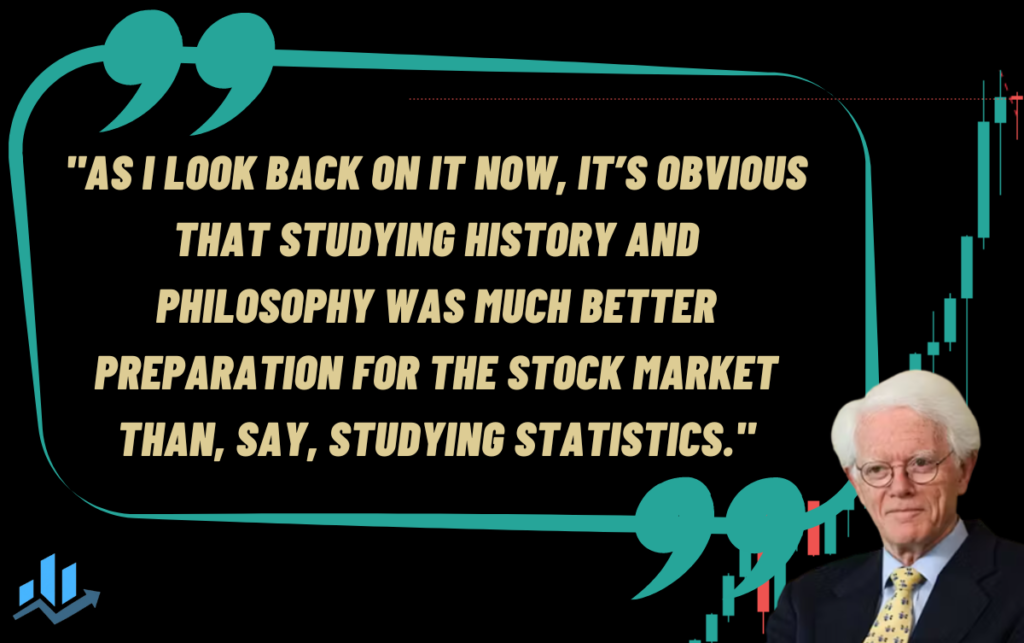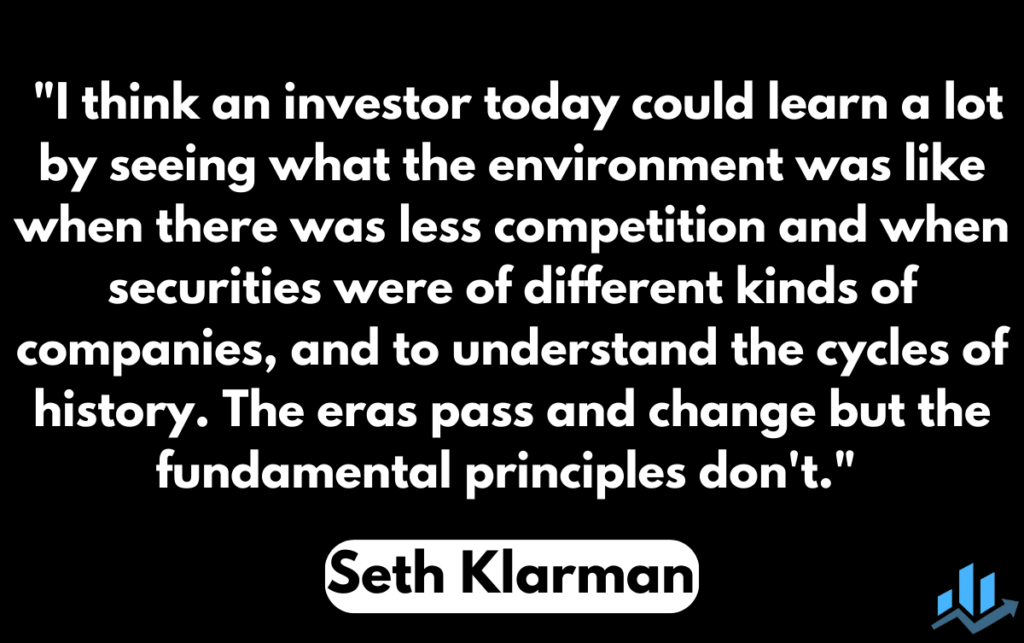
When it comes to the stock market, many beginners have the notion that success is achieved through technical analysis, complicated algorithms, and business acumen. Often, they are overwhelmed by complex charts and jargon, forgetting that sometimes the key to understanding lies not in the future but in the past.
This article aims to shed light on an essential yet frequently overlooked aspect of investing for a stock market beginner – the importance of historical knowledge. Far from being a dry, academic exercise, understanding history can provide the foundational context for interpreting market trends, predicting future movements, and, ultimately, making better investment decisions.
Table of Contents
Toggle1. Stock Market Beginner: Studying History as Preparation for Investing

A. Peter Lynch:
Peter Lynch, one of the most successful mutual fund managers of all time, once said, “As I look back on it now, it’s obvious that studying history and philosophy was much better preparation for the stock market than, say, studying statistics.” This underscores the surprising, yet profound, connection between historical knowledge and stock market success for beginners.
Delving into history and philosophy not only broadens your knowledge base but also enhances your ability to think critically and understand human behaviour, both crucial in the world of investing. History offers lessons on market cycles and trends, while philosophy imparts the ability to question, analyse, and make logical deductions—essential skills for navigating the dynamic stock market landscape.

B. Crispin Odey:
As a stock market beginner, you might ponder the best educational pathway to follow. Crispin Odey, a renowned British fund manager, suggests, “A history degree is far more useful than a CFA [Chartered Financial Analyst].” This may seem unconventional, but it holds substantial weight when one considers the broader perspective that historical knowledge offers.
Pursuing a history degree, or at least a serious study of history, equips a stock market beginner with a wider lens through which to view the market. It offers insights into economic trends and market shifts over time, enabling a deeper understanding of how and why markets move. In other words, understanding history can be an effective tool to anticipate and adapt to the ever-changing financial environment.
2. The Role of History in Predicting the Future

A. Charlie Munger:
Billionaire investor Charlie Munger once asserted, “There is no better teacher than history in determining the future… There are answers worth billions of dollars in a $30 history book.” This statement amplifies the power of historical knowledge in shaping the investment strategies of stock market beginners.
By examining past market trends, we can extract invaluable insights that guide future investment decisions. For instance, studying historical stock market crashes can help a stock market beginner identify patterns or indicators of an impending crash. Similarly, analysing periods of significant growth can provide clues about what drives a bull market. Such a historical perspective enables beginners to make more informed, predictive decisions about their investments.

B. William D. Gann:
The recurrent nature of history, primarily due to human behaviour, is best summed up by the quote from William D. Gann: “History repeats because of the weakness of human nature.” Investors often respond in predictable ways to market events, driven by emotions such as fear and greed. By understanding these patterns from the past, a stock market beginner can anticipate potential future market movements and adjust their investment strategy accordingly.
3. Learning from History to Avoid Mistakes

A. Warren Buffett
Legendary investor Warren Buffett has noted, “What we learn from history is that people don’t learn from history. And you certainly see that in financial markets all the time.” This comment highlights a critical pitfall for many stock market beginners: the failure to draw lessons from the past.
A comprehensive study of history allows stock market beginners to identify and avoid the errors committed by previous investors. For example, understanding the causes and impacts of the dot-com bubble or the subprime mortgage crisis can equip beginners with the wisdom to steer clear of similar risky investment behaviours.

B. Ray Dalio
Ray Dalio, the founder of the world’s largest hedge fund, Bridgewater Associates, reflected on the 2008 financial crisis, stating, “I learned to study history better.” His words underscore the importance of learning from historical events to avert or mitigate the impact of future financial crises.
Dalio also emphasises the concept of a ‘timeless and universal investment’ perspective, which suggests broadening your understanding beyond current times and locales. For a stock market beginner, this means not only focusing on present market conditions but also incorporating lessons from historical market events across different periods and regions into their investment strategy.
4. History and the Understanding of Market Cycles

Seth Klarman, a highly successful value investor, has stated, “I think an investor today could learn a lot by seeing what the environment was like when there was less competition and when securities were of different kinds of companies, and by understanding the cycles of history. The eras pass and change, but the fundamental principles don’t.” This insight highlights the enduring nature of fundamental investment principles across different market cycles and eras.
Knowledge of history plays a pivotal role in comprehending market cycles. For a stock market beginner, understanding how boom and bust cycles have played out in the past can provide invaluable insight into how they might unfold in the future. By analysing historical data and trends, one can identify patterns, indicators, and triggers of these cycles, ultimately aiding in more robust and informed investment decision-making.
Every era in the history of the stock market has its own unique characteristics, influenced by a myriad of factors like technology, legislation, and socio-economic conditions. However, the underlying human behaviours and market dynamics remain surprisingly constant. By studying different eras, a stock market beginner can glean valuable insights that can help interpret and navigate the current market environment.
5. Conclusion
Throughout this discussion, we have explored the importance of historical knowledge for a stock market beginner. We discussed how studying history can equip investors with critical thinking skills and a better understanding of human behaviour. We also examined how an understanding of history could predict future market trends and help avoid past mistakes, underscoring the importance of learning from previous market cycles.
As we have seen, the value of studying history for a stock market beginner cannot be overstated. Understanding history’s role in shaping market trends and cycles offers beginners a unique perspective that complements traditional financial education. It equips them with a comprehensive toolkit to make informed and confident investment decisions.
If you’re a stock market beginner, consider this your call to action: don’t just focus on numbers and charts; delve into the pages of the past. Embrace the wisdom that history offers and use it to chart your unique path in your investing journey. As you embark on this exciting adventure, remember that the key to the future may well lie in understanding the past.
6. Questions & Answers
Question: What is the significance of studying history for a stock market beginner?
Answer: Studying history provides a foundational context for interpreting market trends and predicting future movements in the stock market. It enhances the ability to think critically, understand human behavior, and extract invaluable insights from past market trends that guide future investment decisions.
Question: How does historical knowledge aid in predicting future market trends?
Answer: By examining past market trends, we can identify patterns or indicators of potential future events. For example, studying historical stock market crashes can help an investor identify signs of an impending crash. Similarly, analyzing periods of significant growth can provide clues about what drives a bull market.
Question: How can learning from history help avoid past investment mistakes?
Answer: A comprehensive study of history allows investors to identify and avoid the errors committed by previous investors. For example, understanding the causes and impacts of the dot-com bubble or the subprime mortgage crisis can equip beginners with the wisdom to steer clear of similar risky investment behaviors.
Question: Why is understanding market cycles important for a stock market beginner?
Answer: Understanding market cycles is vital because it provides invaluable insight into how boom and bust cycles might unfold in the future. By analyzing historical data and trends, investors can identify patterns, indicators, and triggers of these cycles, which can aid in more robust and informed investment decision-making.
Question: What does Seth Klarman mean by “the eras pass and change, but the fundamental principles don’t”?
Answer: Seth Klarman means that although every era in the history of the stock market has its own unique characteristics, influenced by factors like technology, legislation, and socio-economic conditions, the underlying human behaviors and market dynamics remain surprisingly constant. The fundamental principles of investing endure across different market cycles and eras.